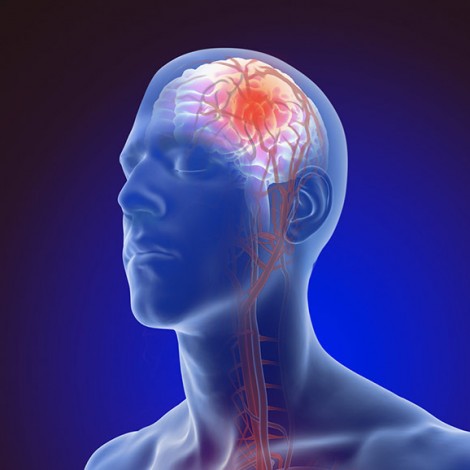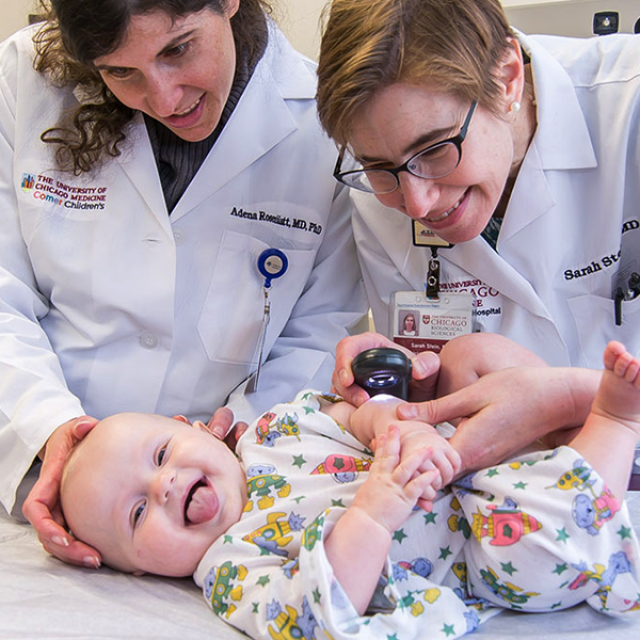
Sections and Programs
The clinical faculty is simultaneously engaged in teaching medical students, residents and fellows as well as conducting cutting-edge translational and clinical research. The close integration with the basic sciences creates a bench-to-bedside culture that values swift application of discovery to patient benefit.
We offer a full spectrum of medical, surgical, pharmacological and support therapies to diagnose, treat and relieve neurological problems. These range from prescription medicines — including experimental drugs — to biofeedback and physical therapy. We also provide genetic testing to identify and better understand brain malformations and diseases and neuropsychological evaluations to test cognitive and behavioral functions.
Department of Neurology Faculty Sections
Cognitive Neurology and Memory Disorders
The University of Chicago Medicine Center for Comprehensive Care and Research on Memory Disorders, also known as the Memory Center, provides specialized, compassionate care for the most challenging memory problems.
Ataxia
The University of Chicago Medicine Ataxia Center provides comprehensive diagnosis, treatment and management of ataxias, a group of degenerative neurological diseases that affect a person’s ability to walk, talk and use fine motor skills.
Epilepsy and Clinical Neurophysiology
The Comprehensive Epilepsy Center at the University of Chicago Medicine is at the forefront of epilepsy care. Many of our patients come to us after trying a number of different medications and therapies with little success.
General Neurology and Sleep Medicine
Our board-certified sleep medicine experts specialize in the assessment of respiratory and non-respiratory sleep disorders in adults and children. With locations downtown, Hyde Park, Flossmoor, Tinley Park and Calumet City, the University of Chicago Medicine offers comprehensive testing, diagnosis and treatment for a broad range of sleep disorders.
Headache and Migraine
In the University of Chicago Medicine Migraine Headache Clinic, patients learn how to modify their lifestyle and living environment to suppress migraine development.
Movement Disorders
At the University of Chicago Medicine Center for Parkinson’s Disease and Movement Disorders, our neurology experts understand that effective care is customized to the unique symptoms and needs of each patient. As an American Parkinson's Disease Association-certified center, we specialize in the treatment and management of complicated and rare movement disorders, as well as symptoms of progressive neurodegenerative diseases.
Multiple Sclerosis and Neuroimmunological Disorders
Neurologists at the University of Chicago Medicine Multiple Sclerosis Program are dedicated to improving the quality of life for people with multiple sclerosis (MS). Our doctors have helped to develop many of the life-transforming treatments currently used to treat MS. We have a distinguished record of providing definitive diagnoses and comprehensive treatments to help patients manage their symptoms and to limit flare-ups and progression of the disease.
Neurocritical Care
Without effective intervention and care, catastrophic brain injuries and neurological disorders can be disabling and life-threatening. At the University of Chicago Medicine, our neurointensive care experts have extensive training and experience in the management of critical neurological conditions, including traumatic brain injuries, stroke, and status epilepticus (an acute, prolonged epileptic seizure condition).
Below is a list of our fellowship trained and neurocritical care board-certified faculty.
Neuromuscular Diseases
The Amyotrophic Lateral Sclerosis (ALS) Clinic at the University of Chicago Medicine is one of the longest continuously running ALS clinics in the world. We offer multidisciplinary care for ALS and other neuromuscular diseases, such as spinal muscular atrophy, muscular dystrophies and other myopathies, hereditary and acquired neuropathies, myasthenia gravis and other disorders.
NeuroOncology
The University of Chicago Medicine's Brain Tumor Center represents the forefront of groundbreaking care for tumors of the central nervous system (CNS), the part of the nervous system that consists of the brain and spinal cord.
Stroke and Neurovascular
At the University of Chicago Medicine, we provide the most contemporary, innovative care for the full range of common and complex blood flow problems affecting the brain and spinal cord. Our collaborative, approach draws on the talents and internationally recognized expertise of leading clinicians in neurology, neurosurgery and neurointerventional surgery.
The Healthy Aging & Alzheimer's Research Care (HAARC) Center
The University of Chicago’s Healthy Aging & Alzheimer’s Research Care (HAARC) Center seeks to serve as an aging and dementia research hub dedicated to the discovery of factors that promote resilience, resistance, and increased healthspan through multidisciplinary research, community engagement, education, and the development of new evidence-based interventions. Please join our research registry to learn more about our active research studies and news from the HAARC Center. Research advancements are possible through the generosity of those who participate in our studies, and we extend our gratitude to you. Join Here.
Resources for Patients
Services
We offer a complete range of neurological tests, including:
- Sophisticated diagnostic tests that are not widely available elsewhere, including high-quality electroencephalography (EEG) and single-fiber nerve conduction and electromyography (EMG)
- A state-of-the-art neurophysiology lab that provides long-term video and EEG-monitoring, as well as 3D computer-imaging analysis to localize brain sources of epilepsy
- Long-term computerized monitoring of adults and children with sleep problems and seizures
- Transcranial Doppler imaging for advanced diagnosis of neurological and vascular problems
- Nerve and muscle biopsies and neuropathological examination
We welcome the opportunity to provide a second opinion on your diagnosis or treatment plan. UChicago Medicine specialists are truly at the forefront of medicine and can offer options not widely available at most hospitals. Call us for a second opinion, at 1-888-824-0200.

















